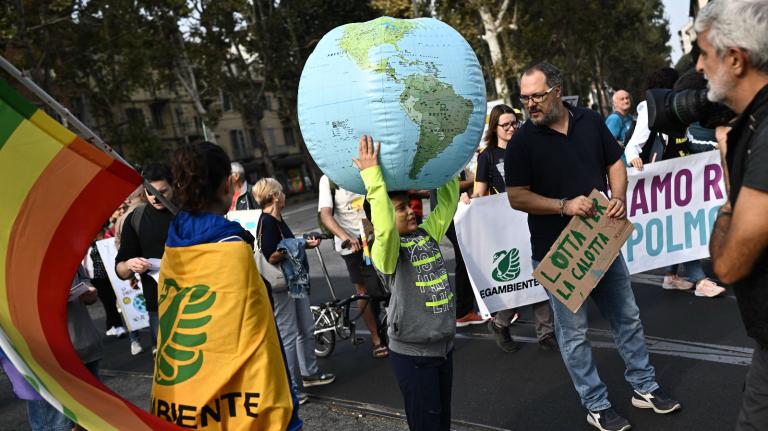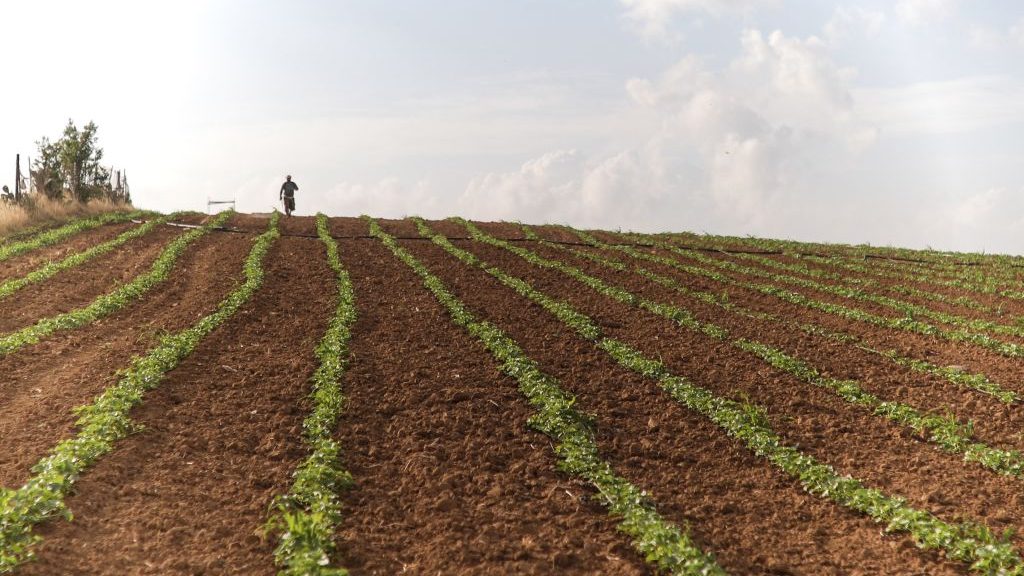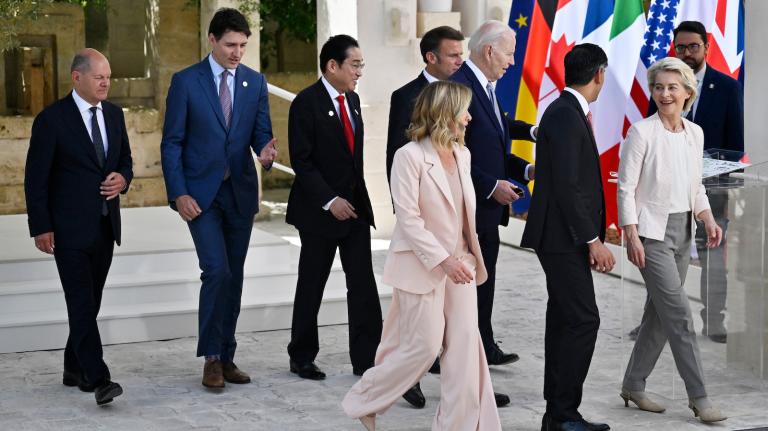Hadeel Ikhmais left her home in the Palestinian city of Bethlehem at 5 a.m. on Tuesday to catch her 5 p.m. flight to Dubai. Ikhmais is the head of the climate change office at the Palestinian Environmental Quality Authority, or EQA, and for months she and her colleagues had been planning to attend COP28, the annual United Nations climate conference taking place in Dubai, United Arab Emirates, this year. Encouraged by the fact that an Arab nation was hosting the conference for the second year in a row, the Palestinian government had paid the United Nations tens of thousands of dollars to secure a pavilion for the first time ever. Pavilions serve as spaces for press conferences, delegate meetings, and venues to showcase a country’s climate priorities to COP attendees. Palestinian delegates spent months designing visuals for the pavilion, securing funds for travel, and preparing materials for the conference. Nearly 50 delegates planned to attend.
Then, on October 7, Hamas launched an assault on towns and villages in southern Israel, and the Israeli military responded with a bloody bombing campaign across Gaza that U.N. experts warn is approaching genocide against the Palestinian people.
Overnight, traveling to Dubai became more dangerous. Bethlehem is located in the West Bank, an area of Palestine that has been under Israeli military occupation since 1967. The region does not have an airport, and Ikhmais would have to make the trek to the Queen Alia International Airport in Amman, Jordan, about 60 miles away. The journey to Jordan had always been exhausting, but after October 7, the Israeli checkpoints that dotted the road to the border became treacherous. Lines were long, travelers were forced to wait for hours, Israeli soldiers conducted intrusive physical searches, and rumors were swirling that the Israeli government might close the checkpoints. Being out in the streets at all was frightening; In recent weeks, the Israeli military has killed civilians in raids on the occupied West Bank.
“I was scared to leave my house because to go to another city during these situations, it’s not an easy thing,” said Ikhmais. “You are going to travel somewhere that you don’t know what is going on.”
Ultimately, Ikhmais passed through the Jericho checkpoint and successfully made her flight to Dubai. In total, fewer than 10 Palestinian delegates made it to Dubai, each facing long and challenging journeys. Her colleague Ahmed Abuthaher, for instance, had a similar experience the previous day coming from Ramallah.
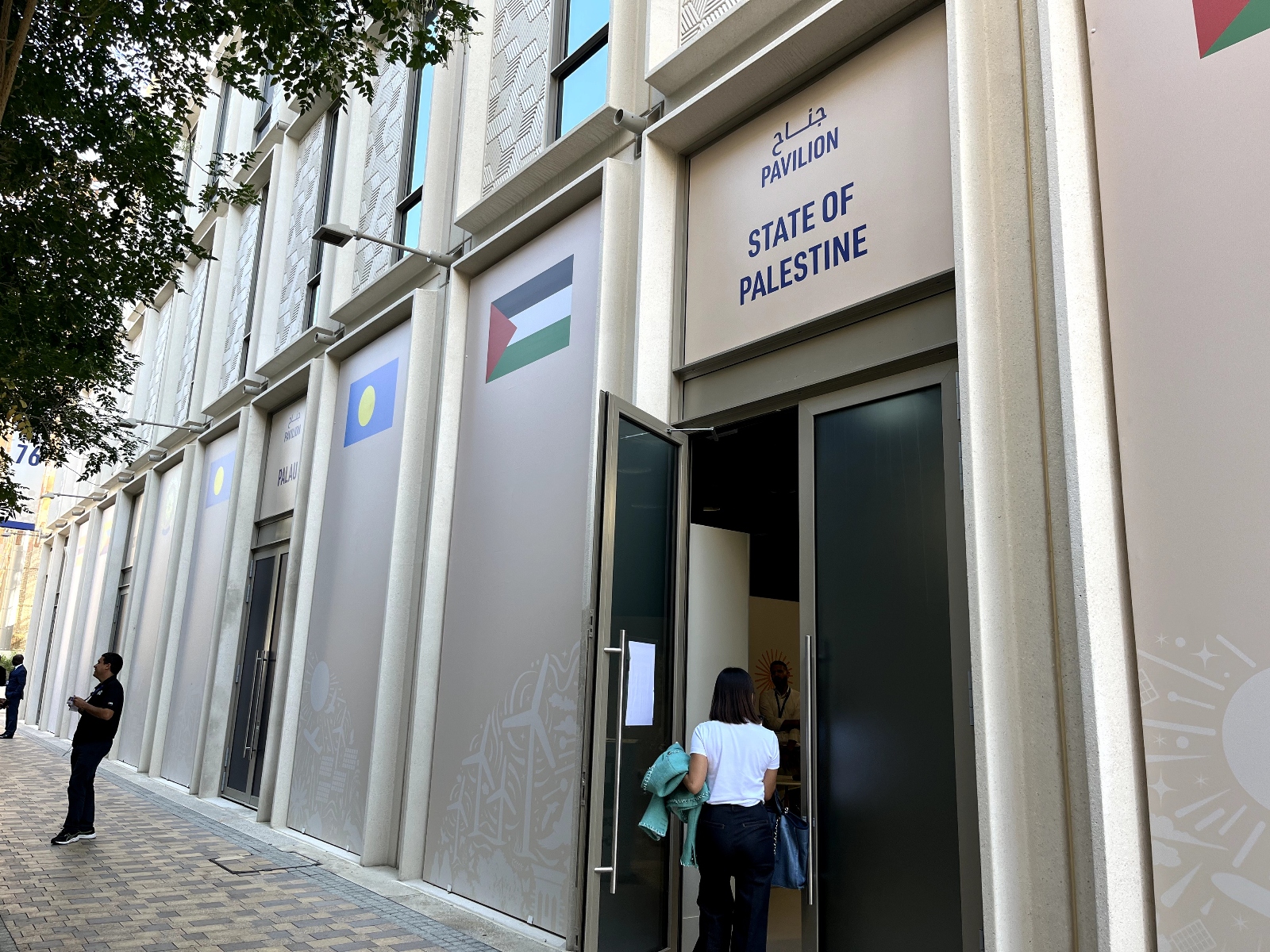
But both Ikhmais and Abuthaher said that despite the daunting travel challenges, it was important to have Palestinian representation at COP28. Gaza is experiencing the impacts of sea-level rise on its Mediterranean coast, and Palestinian farmers are contending with flooding, drought, and drastic fluctuations in temperatures. Additionally, Palestine’s recognition as a member under the United Nations Framework Convention on Climate Change, or UNFCCC, and its subsequent participation in COPs is an assertion of its statehood.
“Even with the difficulties that we face on the ground — the war in Gaza or the Israeli aggression in the West Bank — we are part of the world,” said Abuthaher, who is a director general at the EQA and Palestine’s lead contact on climate change with the United Nations. “And even though our emissions are very, very limited, we are part of this fight. We have to do our part to help others combat climate change.”
That Palestine is even a member of the UNFCCC is the result of a long and hard-fought battle. The government was interested in signing onto the treaty in the late 2000s, but its experience with a different arm of the U.N. held back its admission. It hit a roadblock in 2011 when UNESCO, the U.N. agency that aims to further international peace and security through the promotion of education and culture, voted overwhelmingly to admit Palestine as a full member. In response, the United States withdrew a huge sum of funding from UNESCO, citing a 1994 law that bars Congress from providing capital to any U.N. body that “grants full membership as a state to any organization or group that does not have the internationally recognized attributes of statehood.”
After the U.S.’s decision, “We were very reluctant to join any international platform,” so as “not to cause any harm to developing countries who were looking for that kind of financial support,” said Nedal Katbeh-Bader, who worked as an advisor at the EQA from 1999 until his retirement earlier this year.*
Nonetheless, the agency recognized the importance of joining the UNFCCC. Entering the treaty would afford Palestine equal recognition among the world’s countries and, Katbeh-Bader emphasized, unlock funding opportunities for climate adaptation efforts that the EQA was struggling to get off the ground. In addition to the restrictions imposed by the Israeli occupation, Palestine’s attempts to thwart climate change have been stymied by its location in the Eastern Mediterranean, where temperatures are rising at almost twice the rate of the global average. With the UNESCO fiasco a fresh memory, environment officials in Palestine began meeting with other governments to build a case for admission to the UNFCCC. They won the support of Arab states and, in the lead-up to COP21 in Paris, the French government.
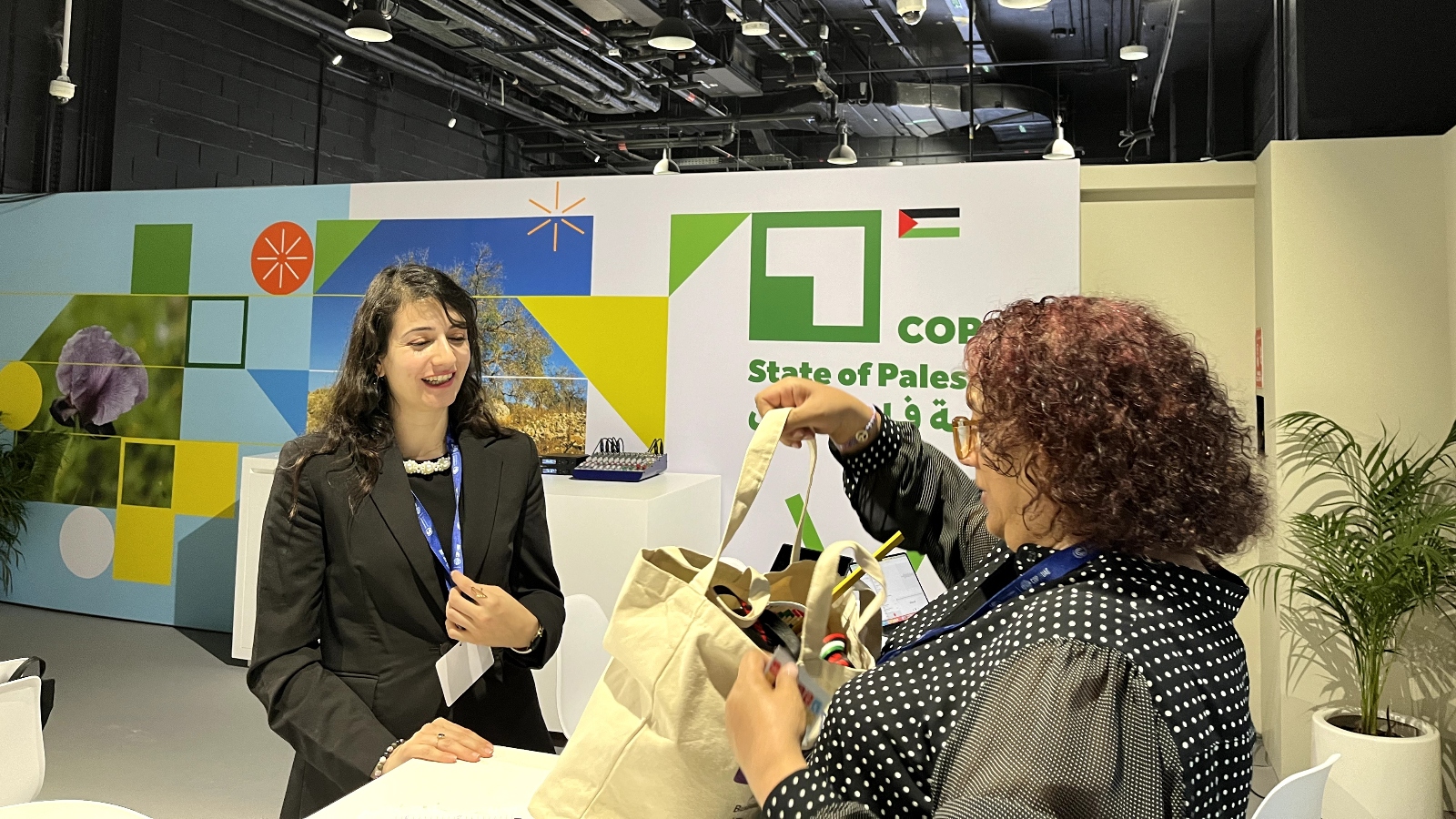
Shortly after the Paris Agreement was adopted in December 2015, establishing the goal of keeping the global average temperature below 1.5 degrees Celsius (2.7 degrees Fahrenheit) above preindustrial levels, Palestine was admitted to the UNFCCC. “The French presidency helped us a lot,” recalled Abuthaher. “After the finalization of the COP, we submitted our application, and there was no objection.”
Palestine was the first U.N. member from the Arab world to sign the agreement, and among the first 15 globally. When its membership was announced in early 2016, a State Department official said that the decision would not impact the U.S.’s participation in the UNFCCC. But upon joining, Palestinian officials immediately ran into challenges trying to secure funding.
Get caught up on COP28
Developing nations often rely on global institutions funded by wealthy nations to finance climate projects. One of the main climate funds is the Global Environment Facility, an intergovernmental body headquartered in Washington, D.C. The U.S. is its biggest shareholder. In the summer of 2016, EQA Chair Adalah Atteerah contacted the Global Environment Facility’s then-CEO, Naoko Ishii, to request funding, but months passed with no response. Repeated attempts to reach the organization over the following year were ignored. (The Global Environment Facility declined to comment in time for publication, citing time constraints.)
“We have two challenges facing us to be able to implement these climate action plans: the Israeli Occupation and the lack of financial resources,” wrote Atteerah in a letter to world leaders before COP24 in Poland in 2018. Palestine had signed onto the UNFCCC in “good faith,” she said, but the funding it needed to fulfill its duties to the convention was being withheld by “some entities.”
All UNFCCC members are required to develop a document called a Nationally Determined Contribution, or NDC, which outlines their annual greenhouse gas emissions and their plans to reduce them.
Palestine submitted its first NDC to the UNFCCC in 2017 and an updated version in October 2021. The document cites adaptation to climate change as its main goal, since Palestine contributes minimally to global greenhouse gas emissions. Both that report and Palestine’s National Adaptation Plan, which it submitted to the U.N. in 2016, name numerous challenges stemming from the Israeli government’s strict control over Palestinian land and natural resources. One of the focuses of both documents is the agricultural sector, which the vast majority of Palestinians rely on for their livelihoods. Rain-fed agriculture accounts for more than 80 percent of farming in Palestine, and increasingly frequent dry spells and soil evaporation from high temperatures are degrading the quality of the harvest. The National Adaptation Plan notes that the Israeli occupation has limited Palestinians’ ability to develop wastewater treatment plants, which could provide an alternative form of irrigation to save desiccated crops.
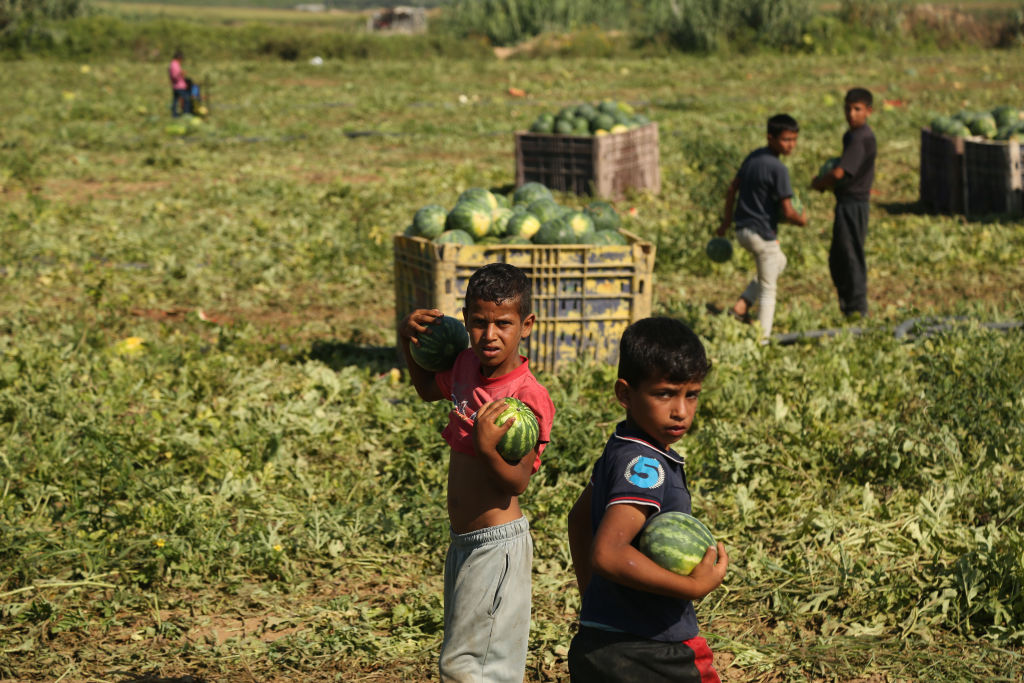
Another focus of the reports is the electricity sector, which currently only fulfills 2 percent of domestic demand, according to the EQA. The Israeli government effectively controls the lights in Palestine, with the majority of Palestinians’ electricity coming from the Israel Electric Corporation. As a result, electricity outages are common, particularly in times of heightened tension and violence such as the Israeli military’s ongoing campaign in Gaza. Before the war, approximately 25 percent of Gaza’s power came from rooftop solar, significantly more than in Israel. The NDC outlines multiple goals, such as the expansion of solar power and the establishment of a national high-voltage grid, but the authors cited complications to these ambitions, too. Israel has historically rejected most of Palestinians’ permit applications for solar development.
Abuthaher said that the EQA submitted a permit request about five years ago to the Israeli government for just 500 square meters of space — about a tenth of a football field — near Jericho to erect solar panels to power a few households. But the land was in Area C, a region in the West Bank administered by Israel, and the EQA was denied permission. “In Area C, we face huge difficulties,” Abuthaher said. “We need their permits.”
In some instances, Israel has also bombed solar panels. In 2018, Palestine received funding from the World Bank to build a 7-megawatt rooftop solar project in Gaza. But the $11.2 million project, celebrated as one of “Gaza Strip’s brightest beacons of promise,” was bombed by the Israel Defense Forces in May 2021. The airstrikes damaged 5,000 of the 21,000 solar panels and caused an estimated $5 million in damage.
Ikhmais and Abuthaher said that in the past, there was an informal understanding that the Israeli government wouldn’t target projects built with foreign funding. “It was a trust that Israel would not harm any project with donor funding,” said Abuthaher. “But that is not the case on the ground.”
The Green Climate Fund, which was established under the UNFCCC to help developing countries finance climate projects, has greenlit several projects in Palestine, including a water banking project in Gaza, a national platform for its climate initiatives, and making water infrastructure more climate resilient. Some of these projects — like the water banking project — were operational before the recent conflict, but Abuthaher said he doesn’t know whether they’ve been bombed in the last couple of months.
“Everything that helps to protect the environment is damaged and destroyed,” Katbeh-Bader said. “Whatever you can imagine in your worst dreams, you will find it in Gaza.”
When the current crisis ends, Ikhmais said the EQA will need to conduct a wide-ranging and detailed assessment of the damage. “We are just waiting for these horrible things to end,” she said.
*Correction: This story originally misidentified Nedal Katbeh-Bader’s former position at the Palestinian Environmental Quality Authority. This story has also been updated with more context on Israel’s bombing of Gaza.
